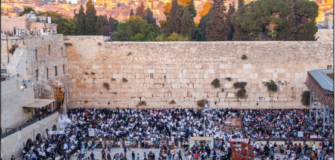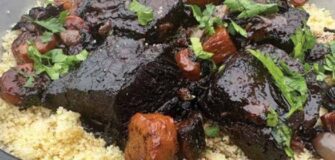Master Chef Tom Aviv: From Tel Aviv to Miami

There are seven traditional foods typically eaten during Sukkot, as well as Tu B’shvat and Shavuot. These are wheat, barley, grapes, figs, pomegranates, olives, and dates.
Israel Masterchef winner Chef Tom Aviv, of Branja restaurant in Miami, loves using the seven in all of his HIgh Holiday cooking. And challenges others to do the same.
“It’s like a Masterchef mystery-box,” Aviv says. “Just put [the seven ingredients] in front of you and see where you can implement them.”
For instance, you can use pomegranates in a salad or in a dessert. “I think it will make [your feast] a little bit more fun,” he says,
Born and raised in Tel Aviv, Aviv became known after winning MasterChef Israel in 2016.
“I grew up in restaurants, and I think [that] made me a little bit intimidated by food,” he said. Aviv spent time exploring food – and eating – which is how he fell in love with the hobby of cooking.
After the experience on Masterchef, Aviv realized he could turn the ideas he puts on a plate into a career; that’s exactly what he has done. Over the past six years, Aviv has launched unique restaurant concepts in Israel and Morocco. His latest, Branja in Miami, is a cultural expedition that brings guests back to Tel Aviv in the ‘70s.
“Miami’s melting pot of cultures and cuisines is much like my own culinary inspirations, which combine the vibrant flavors of my upbringing in Israel with my travels across the globe,” Aviv explains. “The name Branja is Hebrew slang, originating from the word for tree branch, that translates to ‘a circle of friends.’”
In his restaurant, and through his cooking, Aviv tries to explain Israel.
“Israel is a lot more than hummus, falafel, and shawarma,” he believes. “It’s hospitality, it’s kindness. it’s culture.
“I try to bring the experience of Israeli dining and Israeli hospitality outside of Israel.”
In essence, Aviv is a retro-futurist.
“I think that the present is built from the past and the future, and this is how I tried to create my dishes,” he explains. “For example, chopped liver is very retro. And then I think to myself ahead, ‘What will be the WOW factor?’ when I serve it in the future.”
His cooking is all about creating something new, with a respect for heritage.

“In Israel, there are two kinds of houses: Ashkenazi and Sephardi,” Aviv explains. “Because I never had official dinners at home – my parents had restaurants – I used to go to other people’s houses, pick up my favorites and sometimes cross them.”
Aviv likes to combine Ashkenazi and Sephardic influences in his meals, especially during the High Holiday; sometimes these combos are in the same dish.
For instance, traditional chopped liver has caramelized onions; Aviv adds spices like cumin to elevate the palate and make it more Sephardic. His egg salad has Yemenite influences, like turmeric. Plus, Aviv makes his Moroccan fish less spicy, so it is more Ashkenazi.
“As someone who didn’t have any influence, I like to mix everything,” he says.
Aviv calls Israeli Cuisine a “cuisine in process.” At 75 years old, Israel – and its cuisine – is not yet complete. And this is fun food with familiar tastes.
So, why do Americans love Israeli food so much?
“First of all, it’s kind of exotic and different from what people expect, but then not so far from the palette,” Aviv says. “For example, the Latin crowd can understand my excessive use of cumin and cilantro … when you give it to them with interpretation, a little bit westernized, and with a fusion touch, [it] makes people really go, ‘Hmm! I’m tasting something new, but I like it.’ “Sometimes you eat something and just say, ‘Well, it’s very interesting. It’s well made. I’m not gonna come back and eat it,’” Aviv says. “But this food is easygoing… even in a fine dining context.”
When asked about his Rosh Hashanah traditions, Aviv says he usually goes to synagogue and likes to participate in culinary traditions. He makes gefilte fish, chopped liver, egg salad, and Moroccan fish. Even if he is not hosting, he will make those dishes for himself or bring them to the home of his host.
“These are the tastes I need to feel,” he says.
As someone who hosts a lot of dinners, Avivi thinks one of the challenges of hosting is to enjoy the dinner, and not to be a server.
He suggests either catering your meals or cooking things that are easy to prepare ahead of time.
“Miami’s melting pot of cultures and cuisines is much like my own culinary inspirations, which combine the vibrant flavors of my upbringing in Israel with my travels across the globe.”
“In Israel, there are two kinds of houses: Ashkenazi and Sephardi,” Aviv explains. “Because I never had official dinners at home – my parents had restaurants – I used to go to other people’s houses, pick up my favorites and sometimes cross them.”
Aviv likes to combine Ashkenazi and Sephardic influences in his meals, especially during the High Holiday; sometimes these combos are in the same dish.
For instance, traditional chopped liver has caramelized onions; Aviv adds spices like cumin to elevate the palate and make it more Sephardic. His egg salad has Yemenite influences, like turmeric. Plus, Aviv makes his Moroccan fish less spicy, so it is more Ashkenazi.
“As someone who didn’t have any influence, I like to mix everything,” he says.
Aviv calls Israeli Cuisine a “cuisine in process.” At 75 years old, Israel – and its cuisine – is not yet complete. And this is fun food with familiar tastes.
So, why do Americans love Israeli food so much?
“First of all, it’s kind of exotic and different from what people expect, but then not so far from the palette,” Aviv says. “For example, the Latin crowd can understand my excessive use of cumin and cilantro … when you give it to them with interpretation, a little bit westernized, and with a fusion touch, [it] makes people really go, ‘Hmm! I’m tasting something new, but I like it.’ “Sometimes you eat something and just say, ‘Well, it’s very interesting. It’s well made. I’m not gonna come back and eat it,’” Aviv says. “But this food is easygoing… even in a fine dining context.”
When asked about his Rosh Hashanah traditions, Aviv says he usually goes to synagogue and likes to participate in culinary traditions. He makes gefilte fish, chopped liver, egg salad, and Moroccan fish. Even if he is not hosting, he will make those dishes for himself or bring them to the home of his host.
“These are the tastes I need to feel,” he says.
As someone who hosts a lot of dinners, Avivi thinks one of the challenges of hosting is to enjoy the dinner, and not to be a server.
He suggests either catering your meals or cooking things that are easy to prepare ahead of time.
“You do your mase en place, you make your marinations, you cook everything, and then you just pop out food [at dinner time],” he says. “I don’t want to be grilling steaks when everybody has fun and drinks wine.”
One of his favorite make-ahead recipes is a version of couscous beef bourguignon.
“You just need to keep it very low fire, and it is what it is,” he says. “You cook it, plate it, and you eat it.”
Aviv’s favorite food is what he calls his culinary sin: gefilte fish.
“I respect the fact that it was possible to make a fish so bland and so colorless,” he says. “And in the end, it’s enjoyable, as well. You will never expect that you will eat it and enjoy it, but that’s the charm of Judaism I think.
“In Israel, I used to go to this Jewish old restaurant and treat myself with three pieces of gefilte fish. It was always by myself. I would never invite anyone because I was embar-rassed, especially as a chef. It is what it is.”
Aviv likes to eat everything, which he sees as an advantage.
“I don’t have this heritage of food,” he says. “I’m not coming from an Ashkenazi background, nor Sephardi, not Moroccan, nothing. I’m Israeli.
“This is what I want to give to other people. so they understand there are much more layers [to Israel] than hummus and Falafel,” he continues.
Performing artists express their backgrounds through acting and singing. Aviv expresses his culture through food. And through food, and his restaurant, he is exploring himself, too.
Opening a restaurant in Miami was a personal and business decision.
“My mom and her husband live here,” he explains. “I used to travel here a lot and explore the city, and I felt comfortable. And then also the pandemic made Miami Florida a very high-demand destination.”.
Also, Miami is a metropolitan area.
“It contains a lot of Israelis, and a lot of cultures in the same place, which is for me very similar to Tel Aviv,” he says.
In moving to Miami, Aviv discovered there was a lot he didn’t know.
“I had a very clear vision of how I want to do things,” he says. “And through time, comments from guests, watching other places, and [living] in Miami and understanding the vibe, things change. I changed my usage of strong hardcore spices and tastes; I try to be innovative, but commercial at the same time.”
Some things were easy for Aviv in Israel. He was a Masterchef winner and thus a celebrity. He knew what was trendy, he knew every place that opened, and he knew where he could play and where to play it safe. Still, moving to the States was mission-driven and definitely the right decision.
“Although I came [here] with a clear vision of what I’m gonna do, I know everything and I know nothing,” he says. “That elevates you. That brings you to another level of cooking, another level of hospitality. And I think it was the right move, going out of my safe space.”

























